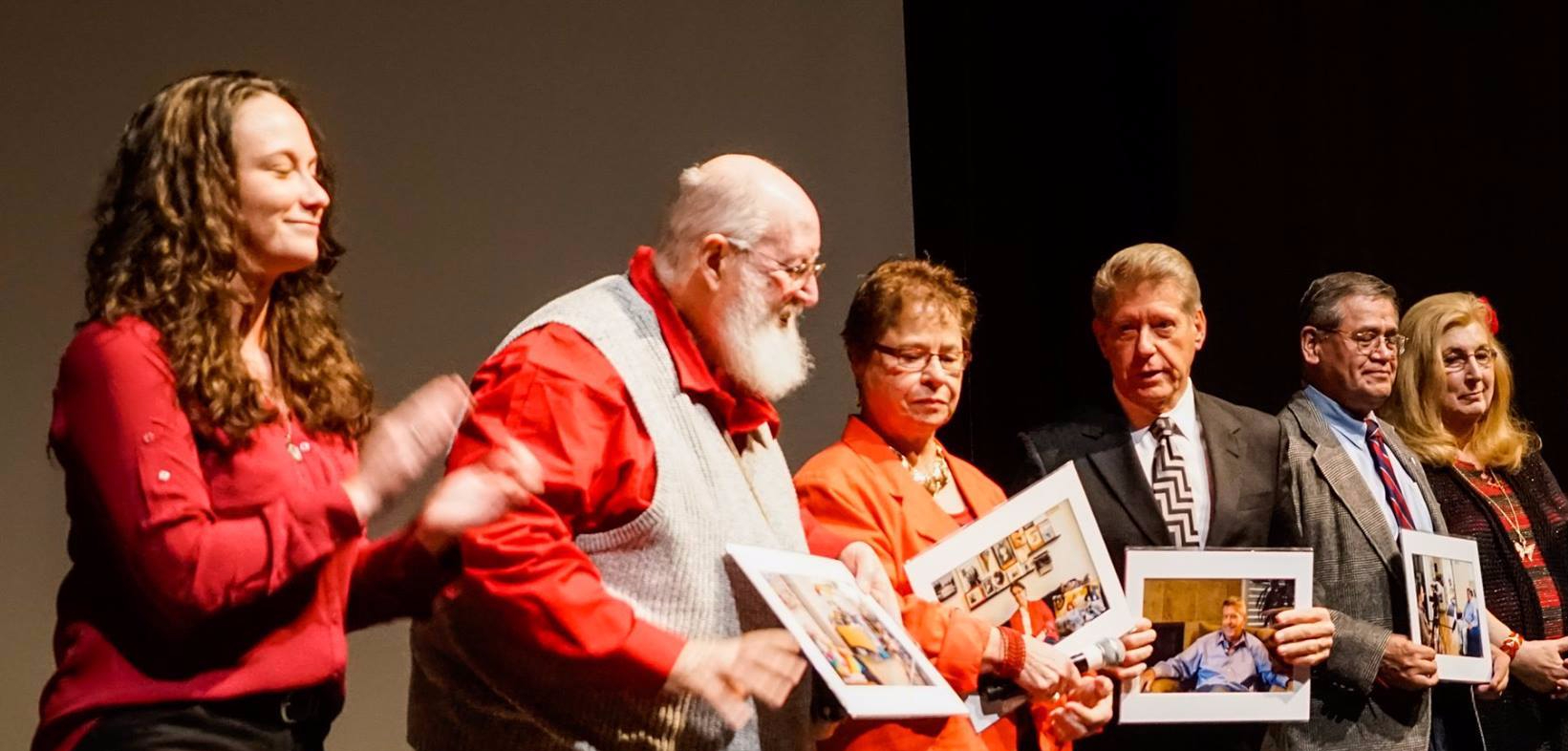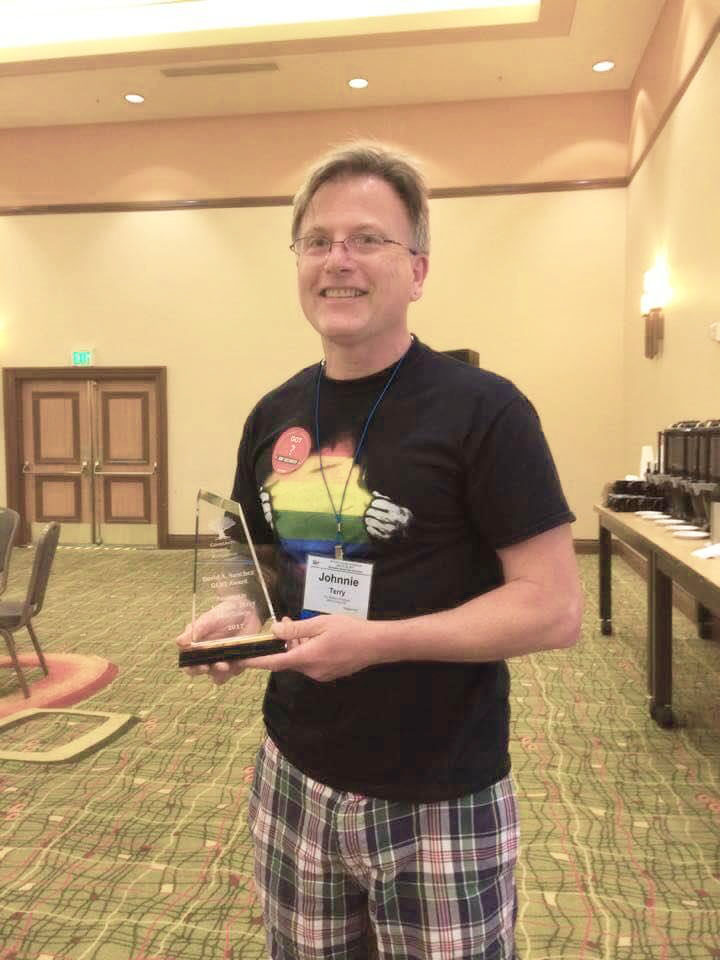Jerry Sloan and Jerry Falwell were best friends as classmates in the 1950s at Baptist Bible College in Springfield, Missouri. Both became clergymen.

LGBTQ+ pioneers honored during the premiere of “The Spectrum Archives: Narratives of Courage” last November.
Flash forward to the 1980s as televangelist and conservative activist Falwell went on to become the Moral Majority leader and Sloan founded two gay churches. After hearing the hateful, vicious things Falwell said on his nationally syndicated TV show, Sloan showed up at a local Sacramento television show where Falwell was appearing. Sloan rose from the audience and confronted Falwell about the malicious statements made on TV.
“It’s an absolute lie,” Falwell shouted. “And I’ll give you $5,000 if you can produce that tape.”
Sloan did. In what has become known as “The tale of the two Jerrys,” a municipal court judge, and later an appeals court, ordered Falwell to pay up after Sloan shared a tape of the broadcast. That was in 1984. Ultimately, the payment topped $8,900, and the funds helped start the Sacramento LGBT Community Center.
Sloan’s story and those of other Sacramento-area LGBTQ+ pioneer activists have been recorded and made into short videos through a Sierra College oral history project called “The Spectrum Archives: Narratives of Courage.”
Funding the oral history project
Sierra College, located in Rocklin, Placer County, is one of three community colleges statewide that have a Lesbian, Gay, Bisexual and Transgender Studies Department. It offers an associate degree program with an interdisciplinary, multicultural major that emphasizes the history and culture of LGBTQ+ persons and covers the ways that sexual orientation and gender identity and expression intersect with ethnic, racial, socioeconomic and political identities.

Sierra College Faculty Association president Johnnie Terry
Sierra College Faculty Association president and LGBT studies faculty member Johnnie Terry and colleagues had been contemplating a small-scale oral history project, one in which students could record their experiences at college. Terry had created an academic standing committee focused on retention of LGBTQ+ students and staff.
“We called it Spectrum because acronyms kept changing,” explains Terry, who was recently honored by the Community College Association. “There is a spectrum of orientations.”
Spectrum was working with the director of the college foundation, Sonbol Aliabadi, to raise startup funds for the project. Aliabadi arranged a meeting between Terry and her friend, former Assembly Member Dennis Mangers, dubbed by news media as the “Gay Godfather of Sacramento.” He helped the story take another direction.
Mangers, who was seeing his friends aging, pitched the idea of an oral history project featuring Sacramento-area LGBTQ+ pioneer activists.
“I went back to campus feeling like I met a truly great man,” says Terry. He contacted his colleague, instructor and videographer Angie Coughlin, who researched costs and wrote the proposal. Mangers provided funding to start the project.
Neglected history comes to light
That was over two years ago. Today, students can take a one-unit LGBTQ+ narrative class and a videography class. Then they have the opportunity to participate in Interviewing LGBTQ+ pioneers in the Sacramento region. Coughlin works with advanced videography students who scan photos and articles for “b-roll” in the videos, and oversees the conversion of over 60 hours of raw footage into 15-minute short documentaries, or shorts.
Student intern Kate McCarthy became deeply involved in the project. McCarthy, who had been a K-12 teacher, retired six years ago and decided to take one college class per semester. Her first class was Queer Theory, and that’s how she met Johnnie Terry — and the rest is, well, history.
“From a teacher perspective, this is history that is neglected by the mainstream media,” she says.
The response has been awe-inspiring and sparks dialogue, akin to projects like Japanese internment camps and veteran projects. —Kate McCarthy
McCarthy took photos of the process, which can be seen on the group’s Facebook page. She enjoyed watching the younger students interview the pioneers.
“They get so engaged with older people — it’s a marvelous thing to watch,” she says, adding that it’s important to capture this history for the LGBTQ+ community and as a part of local history.
The project premiered in November, just days after the 2016 election. As people watched the video documentary, “you could feel the energy building, and the excitement,” Terry says. “There was crying, laugher, applause. It was overwhelming.”
“The response thus far has been awe-inspiring and sparks dialogue, something akin to projects like the Japanese internment camps and veteran projects. Just the process of capturing history for posterity enriches the people involved, and this product that can be accessed by generations to come,” McCarthy says. “I’ve been lucky to do it.”
The video will be presented at the CCA Fall Conference in San Jose, Oct. 13-15, and is viewable online.
Meanwhile, the student-produced short videos are being submitted to events such as the Sacramento International Gay and Lesbian Film Festival. “It’s great for students who make the shorts to win awards. Imagine how that’d help their careers,” Terry says.
The Discussion 0 comments Post a Comment